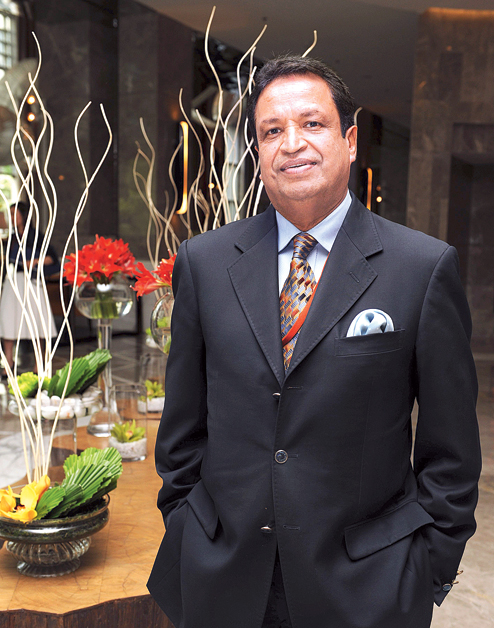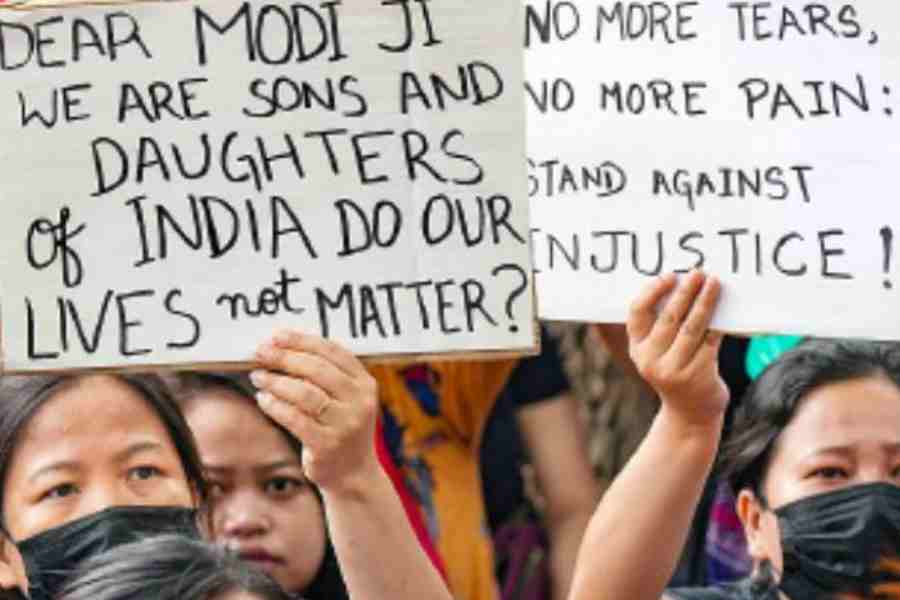
He’s a billionaire who thrives on crisis. Nepal’s richest man snapped up hotels in Sri Lanka when the island was, as he says, “literally on fire”. Today, he’s building a factory in Kenya that will turn out packets of his bestselling Wai Wai noodles and he’s constructing a hotel in Rwanda which is still in recovery mode after a devastating civil war. “When a country is going through its worst time is the best time to enter,” says Binod Chaudhary emphatically.
It’s a daring entrepreneurial philosophy that has worked wonders for Nepal’s only dollar billionaire, who was reckoned by Forbes Magazine to be worth $1.32 billion at last count, and who’s on a multi-pronged expansion spree building hotels, industrial parks, cement plants and, of course, more factories to make his bestselling Wai Wai noodles.
Today, Chaudhary has multi- million-dollar pads in Singapore, the Philippines, Dubai and Delhi and he’s constantly on the move, checking out his empire that stretches from half-a-dozen countries in Africa to the Middle East and India all the way to the Philippines. “Apart from Nepal, my territory is Singapore, Philippines, Thailand, Sri Lanka, Maldives, the Indian subcontinent, Dubai and Africa mostly,” he says, reeling off the countries where his Chaudhary Group is scaling up
its activities.
.jpg)
And for one week each month he returns to Nepal where he once contemplated entering politics. “I feel that I have come back home when I go to Nepal,” he says. About his foray into politics he says thoughtfully: “I will be very totally prepared to dedicate every minute of my life if I can make a difference, but if I feel I am going to make minimal
impact, then no, I won’t be in politics.”
It goes almost without saying that he has king-sized ambitions for the Indian market, which he views almost as home territory. Building on his philosophy of investing where other, less daring, businessmen fear to tread, he already has several Wai Wai factories in India’s Northeast and he’s looking at erecting more and munching up a bigger share of the region’s noodle business.
But that’s only a small part of his pan-Indian dream. The Chaudhary Group currently turns out about two billion packets of noodles annually and it’s looking to heaping up its plate and pushing that to 10 billion packets in the next decade. Already new factories are being built in Bihar, Madhya Pradesh and Rajasthan and more are on their way. In addition, he’s also setting up an industrial park focusing on food in Rajasthan.
.jpg)
Zinc Journey’s Arro Khampa in China
There is also the brick-and-mortar business of hotels. Earlier this month, Chaudhary made a whistle-stop trip to Jammu & Kashmir to sit across the table from chief minister Mufti Mohammad Syeed and he’s bubbling with enthusiasm about building a hotel in the troubled state. “My team is there right now. We’re definitely going to be in J&K.”
The hospitality industry is, in fact, one of the Chaudhary Group’s hugest success stories. Today it has 88 hotels in 11 countries and the aim is to have a meteorically growing portfolio of 200 by 2020. Again, the group’s growth in hotels has been all about boldness and moving at lightning speed. Chaudhary snapped up hotels in Sri Lanka when the island nation was wracked by a long-running and bloody insurgency. Today, as tourists return to Sri Lanka’s beaches and tea estates, his 17 hotels there are ringing up big profits. “Some of the properties that nobody wanted to touch in the country have become the gems of our portfolio,” he says.
His latest move has also been about spreading the Chaudhary Group’s tentacles in the Indian hospitality industry. Chaudhary has just moved into a partnership with the Concept Group, which runs the mid-market Fern
Hotels. It’s also in partnership with the Taj Group in Sri Lanka and the Maldives and Taj Safaris which runs smaller resort hotels near game parks.
The scale of Chaudhary’s ambitions and expansion plans can only be described as breathtaking. Consider that his grandfather got a relatively modest start in business by importing fabric from India and selling it in Nepal and eventually wound up with customers who included the royal family. Chaudhary, himself, started out in business when he was in his late teens by turning up the volume and starting Kathmandu’s first nightclub, which he insists was a high-decibel success and not a frivolous venture started by rich kids. “We had to close it down though it was successful. It was a solid opportunity for me and my friends,” he says, looking a trace nostalgic.
.jpg)
The decisive moment of truth in his life came at 18, when he was about to head to India to study chartered accountancy. His father was diagnosed with a debilitating heart ailment and was told by the doctor that he couldn’t continue to run his business. Chaudhary, the eldest son, had to step into the breach and take command. He says: “My life was overnight changed completely. I did not have a choice at all. But it has made me a tougher man.”
The seeds for growth — or more accurately, the flour — were laid just as Chaudhary moved to the helm. The group had spotted an opportunity and moved into making biscuits, but some years later found it had an excess of flour even though it had become Nepal’s biggest biscuit maker. The leftover flour became the raw material for the diversification into Wai Wai noodles.
Chaudhary likes to tell the story of how he saw that Nepalese travellers were bringing back packets of ready-made noodles from Bangkok and figured he could meet the hunger for the product domestically. Some years later, he made another key move and became the first mover and founder of Nepal’s first private sector bank — this has been a key profit-maker for the group.

He’s now keen to bring his Nabil Bank to India and is talking to the government about this. “There are two Indian banks in Nepal. Why not a Nepalese bank here? It would enhance the close socio- economic linkages of the two countries,” he says.
From there, it has been a question of spotting the right opportunities wherever they might be. Says Chaudhary: “I see opportunities everywhere. When there are troubled times, it is a better opportunity. One has to sense, to smell, which way the wind is blowing.”
Still, how does he seize opportunities with such speed and alacrity? First, as he says, there’s his remarkably developed ability to sniff out the right moves to make. But, beyond that, there’s his hands-off style of doing business. “I have zero executing responsibility,” he says firmly, adding “It’s all handled by the next generation of the team. I help them as a mentor.”
On a more philosophical note he adds: “Running a business I think is a question of developing an organisation and delegating what you need to delegate. It’s a question of empowering people, but also making them feel they have to be on their toes.”
A.jpg)
This is where his three sons — Nirvana, Rahul and Varun — come into the picture to look after different wings of the empire. Nirvana, the eldest is based in Nepal, Rahul in Singapore and Varun in Dubai — though professional managers also run large chunks of the empire.
Chaudhary says a great deal of his time is spent speaking at conferences like one revolving around the hotel industry in Delhi last week and another being organised by Forbes Magazine in New York in the near future. After Nepal’s monarchy was abolished, he was also a member of Nepal’s constituent assembly for four years and devoted considerable
energy to resolving the country’s knotty political problems.
There have, of course, been missteps in his empire-building career. Chaudhary recounts how the group had pinned its faith on Dubai as the fast-growth Middle East entrepôt that would act as a hub between Asia and Africa. “When we went there 10 years ago, the place was rocking. The price of real estate used to literally shoot up every morning and every evening. Many Indians, Pakistanis and Russians put everything they had in Dubai,” he says.
He adds: “One fine morning came the global financial crash and it was a different world. We had felt that Dubai was going to be the hub and drive us in the future in Africa and the Middle East. We had to completely change overnight.” But the Chaudhary Group had been prudent in its real estate investments and wasn’t pushed to the brink by the crash. “It’s all a question of having that resilience to quickly adjust, to quickly manoeuvre,” he says.
Chaudhary seems remarkably unaffected by his immense wealth. He leads a relatively normal life — even when he’s constantly on the move — rising at around 7.30, reading the newspapers and then religiously doing his workouts which include weights and Yoga and walking on the treadmill (“If I’m in a nice location I do a nature walk,” he adds). If he’s in Kathmandu, he then spends time with his family before heading off to a string of meetings. In the evenings he does a lot of reading and he adds, “I’m an old-fashioned man. I need the hard copy. I need the newspapers, the magazines and I still see the news on the TV — I’m not a thick book reader,” he adds. He’s also a follower of Sri Sri Ravi Shankar and once a year he does a 10-day trek in the mountains. “I believe that there’s nothing which is so holistic than trekking in the Himalayas. It is emotional, spiritual and it is physical.”
But, first and foremost, it’s business that drives him. He says: “I do business like Zubin Mehta does his music. The same way an artist paints a painting. I put my heart and soul into it. When I see a brand or a product taking shape, that is when I feel rewarded. It’s not about looking at the bottom line.”










